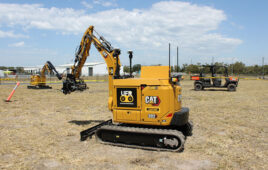In Episode 176 of The Robot Report Podcast, we feature an interview with venture capitalists Juliette Chevallier, Principle at Scale Ventures, and Jasmeet Singh founder of JMOON Ventures.
It’s VC week here at the podcast.
This episode features interviews with Juliette Chevallier from Scale Ventures and Jasmine Singh from Jay Moon Ventures and covers investment trends in robotics, emphasizing the importance of execution risk over technical risk.
Juliette Chevallier, Principal, Investments, Scale Venture Partners
Juliette Chevallier has a background in autonomous vehicles and robotics, having previously worked at companies like Google Chauffeur (now Waymo) and MIT spinoff Optimus Ride. She joined Scale Venture Partners about 2 years ago to lead their investment thesis on robotics, AI applications, and cybersecurity. Scale Venture Partners’ approach focuses on investing at the point of execution risk rather than technical risk, looking for companies with a working product and proven product-market fit. Juliette emphasizes the importance of understanding the customer ROI and business model as key criteria.
In her role as a VC, Juliette prefers to have a deep, hands-on involvement with portfolio companies, acting as a strategic sounding board and collaborating closely with founders to work through tough problems. She sees her role as helping founders navigate the operational and go-to-market challenges. Juliette notes a renewed interest in robotics from VCs, though she is cautious about some “wild” valuations and funding rounds, preferring bottoms-up market analysis over top-down figures.
Juliette is bullish on the potential of robotics foundation models (RFMs) to drive transformation, emphasizing the need for more multi-modal AI models that integrate vision, action, and communication. She is excited about the possibilities of AI to enhance robotics, but cautions about the risks of AI development burning through funding. Overall, Juliette’s approach focuses on de-risking execution and operational challenges for robotics startups, leveraging her deep technical and business expertise to support founders.
Learn more at: www.scalevp.com/
Jasmeet Singh, Founder, JMOON Ventures
Jasmeet Singh has a diverse background spanning robotics engineering, founding startups, and investing since 2012. As an investor at J Moon Ventures, he focuses on “physical AI” startups – those combining hardware, electronics, and AI in areas like robotics, IoT, and 3D printing.
Jasmeet emphasizes the importance of solving real problems, not just building cool technology. He looks for startups with a strong understanding of the user and business model, noting operational challenges like scaling manufacturing and finding the right business model.
Compared to the more risk-averse Canadian market, Jasmeet sees the US as a better environment for robotics fundraising. He advises founders to target large, underserved problems and focus on customer service and support.
Some of Jasmeet’s investments include Orange Wood Labs, Brisk AI, and Rural Hologram. As he launches J Moon Ventures, he is particularly interested in opportunities in agriculture, construction, medical, and sustainability.
Overall, Jasmeet brings a unique perspective as an investor with deep technical expertise and operational experience in robotics. He is focused on backing founders solving real-world problems with innovative hardware-software solutions.
Learn more at: jmoon.ventures/
Show timeline
- 8:40 – News of the week
- 26:38 – Interview with Juliette Chevallier
- 1:03:00 – Interview with Jasmeet Singh, AKA The Bearded Maker
News of the week
Humanoid video of the week
@plugfc7 Kai’s 1X Robot didn’t last long after getting rebooted #kaicenat #1x #1xrobot #fyp @Kai Cenat
Recent videos featuring internet influencer Kai Cenat and his 1X EVE robot have sparked a significant discussion about the readiness of humanoid robots for domestic use. In one particular incident (seen in the TiKTok video above), the robot abruptly powered down and fell over, raising concerns about potential safety hazards and the current limitations of humanoid technology. This event highlights the need for rigorous testing and development before deploying such robots in homes, as opposed to the more controlled industrial environments where they are currently being trialed.
ASTM developing testing standards for mobile manipulators
The ASTM F45 subcommittee is developing a new standard to evaluate the agility of mobile manipulators. This standard aims to provide a standardized testing procedure similar to automotive evaluations, allowing manufacturers to benchmark their solutions and identify areas for improvement. The proposed tests involve tracking a specific path on a table surface and inserting pegs, assessing the robot’s precision and coordination between arm and base movements. This initiative and other ASTM F45 efforts in mobile robot testing underscore the growing importance of standardized evaluation methods for advancing robotics technology.
GEODIS reaches 10M picks with Locus mobile robots
Locus Robotics and GEODIS have reached a major milestone with over 10 million units picked using autonomous mobile robots (AMRs) at a GEODIS distribution center in Pennsylvania. Locus’s AI-powered platform, LocusONE, optimizes worker productivity by directing them to the next pick location, reducing wasted time and boosting efficiency. This partnership highlights the increasing adoption of warehouse automation to meet growing e-commerce demands and improve operational efficiency.
2025 RBR50 Robotics Innovation Awards open for nominations
You can now submit nominations for the 2025 RBR50 innovation awards. They will recognize technology and business innovations in the calendar year 2024, and the awards are open to any company worldwide that produces robotics or automation.
The categories include:
- Technologies, products, and services: This category includes primary or applied research focusing on robotics and supporting technologies such as motion control, vision, or machine learning. It also includes new products and business, engineering, or technology services.
- Business and management: This category covers initiatives positioning a company as a market leader or an organization as an important thought leader in the robotics ecosystem. Significant mergers and acquisitions are relevant, as are supplier, partner, and integrator relationships.
- Applications and markets: The RBR50 will also recognize innovations that improve productivity, quality, and cost-effectiveness, as well as those that automate new tasks.
In addition, the 2025 RBR50 awards will celebrate the following:
- Startup of the Year
- Application of the Year
- Robot of the Year
- Robots for Good Award
The deadline for submissions is Friday, Dec. 20, 2024.
Podcast sponsored by FlexQube
The show this week is sponsored by FlexQube. Move material with any size, shape, and weight with the FlexQube Navigator AMR, the world’s first multi-purpose and non-load carrying robot.
The FlexQube Navigator AMR features a standardized coupling interface to connect with an ecosystem of different load carriers depending on the customer’s needs.
The system also features a safety-rated identification of load carrier footprint to secure a safe and efficient scale-up of different use cases in a factory or warehouse.
FlexQube Navigator – robotics that delivers!
To learn more about FlexQube’s solutions goto: https://www.flexqube.com






Tell Us What You Think!